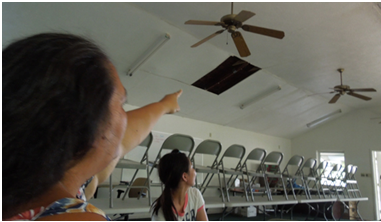A Japanese Woman Facing the “Paradise Shadow”
Yumi Otaki who runs a hula studio in Hachioji, Tokyo, wants to save children in Waianae, which is located in the east side of Oahu Island. It has a root to native Hawaiians, and many people come from poor families. Some become homeless and live in tents. People there are self-sufficient, but in order to make a minimal living, they also have to look for work by the day. Some even beg. Here is a Japanese woman enthusiastic about fund-raising activities for children living in Waianae.

Ms.Otaki (left) Ms.Kumupua (right) leader of Waianae Language School
Ms. Kumupua was interviewed on the TV documentary Ms.Otaki saw and she gives support for children in Waianae.
Ms.Otaki saw a TV documentary that covered the poverty in Waianae. It made her want to return a favor to Hawaii, because she appreciates the hula culture. She holds hula charity shows, and sells the hula school T-shirts to raise fund and sends money to people in Waianae.
Poverty rate in Waianae is highly as 12%, so children cannot receive enough education. In addition, their living standard is low. Some of facilities that children use after school have broken ceilings. When she visited there, children gave her a warm welcome saying, “ALOHA!” Despite the harsh reality, their smile is just as innocent.Poverty rate in Waianae is highly as 12%, so children cannot receive enough education. In addition, their living standard is low. Some of facilities that children use after school have broken ceilings. When she visited there, children gave her a warm welcome saying, “ALOHA!” Despite the harsh reality, their smile is just as innocent.
Children only get one meal and that is the school lunch. In school, children can earn coupons for getting good grades, doing nice things for their classmates. Then they can use the coupons to buy school supplies. The Hawaii state government offers shelters to help children, but this does not necessarily improve their quality of life in a long-run.
Ms.Otaki was disappointed to find out that Japanese hula dance teachers are not aware of poverty in Hawaii. She took her daughter to Waianae because she wanted her to observe the “paradise’s shadow” with her own eyes. “It is entirely a grass-root campaign, but this is my life-long commitment,” she says proudly.
Hawaii is not a paradise as we imagine. It is first important for us to realize the problem, and our increased awareness of poverty in Hawaii would help shaping a better future.
Written by Keigo Matsumoto
Edited by Serina Omata
Postscript
It is the first time for me to write an English article. I wanted many people to be aware of the situation in Waianae, Hawaii, and I wrote it with the help of a Japanese lady who puts much effort in solving the problems that people in Hawaii struggle with. Since poverty in Hawaii is not commonly known in Japan, I had a difficulty finding people to interview, but at the end, I managed to get an appointment. Ms.Otaki, an interviewee, answered to every question I had for her. Through this interview, I learned many things that I was not able to find on the Internet. I will take an advantage of this experience and will do my best on the next article. (Keigo Matsumoto)



